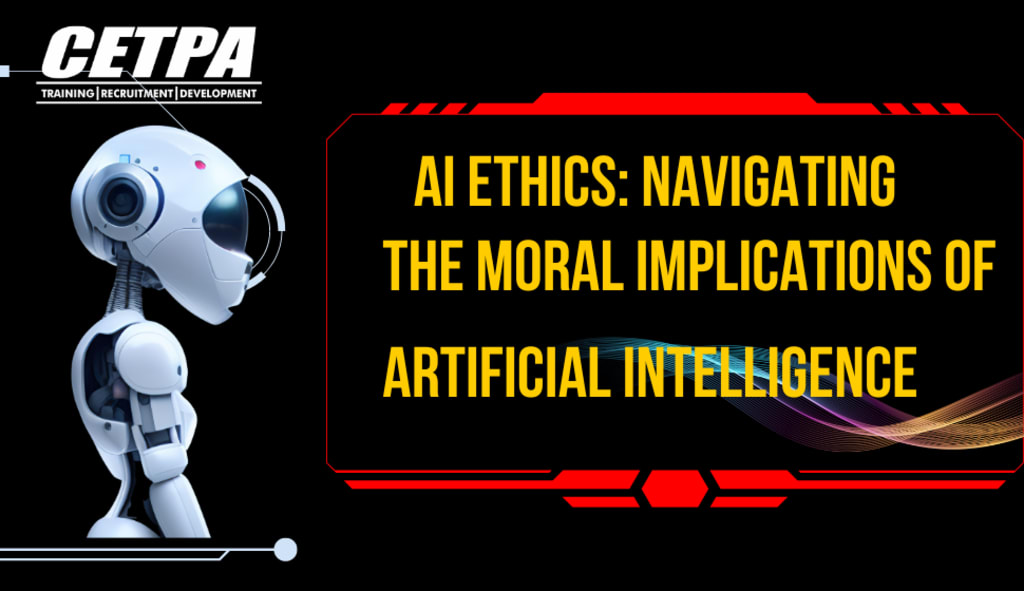AI Ethics: Navigating the Moral Implications of Artificial Intelligence
Artificial Intelligence

- By CETPA Infotech Pvt. Ltd.
As artificial intelligence develops quickly, it presents a significant issue. Data security and privacy are ethical issues with AI since the technology needs enormous volumes of data to work. Concerns about fairness and prejudice occur when AI systems unintentionally reinforce social biases seen in their training data. As AI systems develop the capacity for decision-making, the issues of autonomy and accountability surface.
Furthermore, the effects of AI on work create concerns about job disruption and loss. Concerns about their usage in conflict are brought up by the development of AI-powered military systems. Building confidence in AI systems also requires openness and comprehensibility. Thus, it is crucial to address these issues to negotiate the ethical implications introduced in the Artificial Intelligence Online Training and guarantee that it is deployed responsibly for the good of society.
As we go along in this article, we shall dive deeper into some of the ethical challenges put forth by AI and also explore the potential approaches to addressing the same:
Data Privacy and Security: The most significant ethical challenge surrounding AI is data privacy and security. AI systems often depend on large amounts of data to function efficiently, resulting in potential breaches of user privacy. Companies shall ensure that they work in accordance with strict data protection regulations and take up powerful security measures for safeguarding sensitive information.
Bias and Fairness: AI algorithms introduced in the AI courses by institutes like CETPA Infotech may unintentionally preserve societal biases available in the information they are trained on. These biases may lead to discriminatory results, thus affecting specific groups much more negatively in comparison to others. Developers must systematically choose to identify and minimize these biases during the development and testing stages of AI systems.
Autonomy and Accountability: Since AI systems become more updated, this may result in them possessing a vital decision-making authority. This also generates the question that who shall be held responsible for their activities. Thus, the establishment of a clean framework of responsibility and liability for AI systems is necessary for ensuring transparency and accountability.
Also Read: Exploring AI in Robotics: Advancements and Applications
Employment Disruption: The rapid combination of AI and automation in different industries has resulted in the generation of concerns regarding job displacement and the future of work. Although AI has the potential to create new job opportunities, it may also make specific job roles outdated.
AI in Warfare: There are moral concerns concerning the deployment of AI-powered military systems in conflict. Uncontrolled escalation and the death of civilians might result from autonomous weapons systems. To stop the abuse of artificial intelligence in combat, the international community must come together to set rules and standards. For peace and security on a global scale, it is essential to strike a balance between the advantages of AI in defense and its possible threats.
Transparency and Explainability: Concerns have been raised about the lack of transparency and explicability in some AI models, such as deep learning neural networks. It is difficult to comprehend how judgments are made using these "black box" algorithms, which decreases confidence in AI systems. Users' confidence and acceptance of AI-generated outputs may be increased by promoting the creation of interpretable AI models and offering explicit justifications for such outputs.
In AI Ethics, the ethical issues raised by the creation and use of artificial intelligence are examined. This area of study covers concerns including data privacy, equity, bias reduction, and the effect of AI on the labor market. Additionally, it explores the issues of responsibility and independence in AI decision-making. In order to navigate AI ethics, one must strike a balance between the advancement of technology and moral concerns, guarantee the transparency and understandability of AI systems, and establish rules and standards to stop the misuse of AI, particularly in conflict.
It's a Wrap!
AI ethics is a complicated and developing area that needs ongoing investigation and ethical decision-making. It is increasingly important to consider the moral implications of AI's applications as it continues to influence our lives. Defining accountability and autonomy, encouraging justice and minimizing biases, planning for employment disruptions, controlling AI in combat, and assuring data privacy and security are all crucial measures to take in navigating the ethical difficulties presented by AI. We can maximize the benefits of Artificial Intelligence Training in Noida for society while preserving our moral principles by including ethical concerns in the development and use of AI systems.
About the Creator
CetpaInfotech
CETPA INFOTECH PVT LTD is the leader in the “specialized training” brands of India certified by ISO 9001:2015 for its best quality. CETPA INFOTECH is the largest training.






Comments
There are no comments for this story
Be the first to respond and start the conversation.